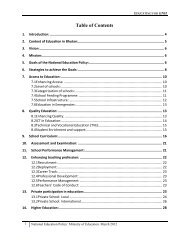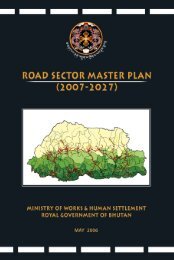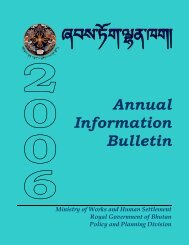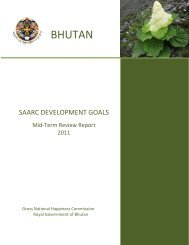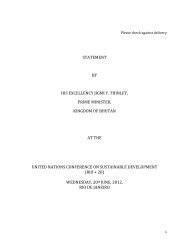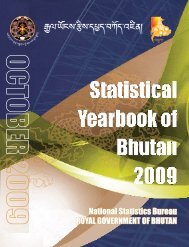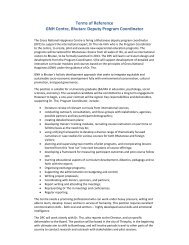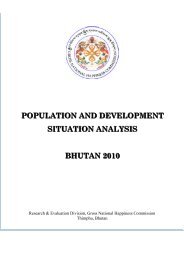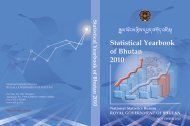COUNTRY BACKGROUND - Gross National Happiness Commission
COUNTRY BACKGROUND - Gross National Happiness Commission
COUNTRY BACKGROUND - Gross National Happiness Commission
Create successful ePaper yourself
Turn your PDF publications into a flip-book with our unique Google optimized e-Paper software.
Aid Policy<br />
9.20 Sector Ministries, Departments and specialised agencies of the Royal Government are not allowed<br />
independently to solicit aid: only the Planning <strong>Commission</strong>, which operates in close coordination with the Ministry<br />
of Finance, may do so, and, as noted earlier, the Planning <strong>Commission</strong> is the authorised contact point for aid<br />
agencies in their official dealings with the Royal Government. However, it is recognised that, in the course of<br />
preparing aid projects which have already been included in the RGOB development programme, and in their<br />
subsequent implementation and monitoring, the external financing agency needs to have good contacts at technical<br />
level with the implementing Ministry, department or agency. Such contacts are encouraged, but the Planning<br />
<strong>Commission</strong>, the Ministry of Finance and the Royal Civil Service <strong>Commission</strong> should be kept fully informed of all<br />
such contacts, and should be appropriately represented on aid agency/RGOB coordinating committees. Within<br />
sector ministries, it is expected that the Policy and Planning Divisions (PPDs) which are now being strengthened<br />
will be the main contact point for aid agencies. The PPDs in turn, will have strong working links with the Planning<br />
<strong>Commission</strong> which will continue to exercise overall responsibility for aid coordination.<br />
Aid Management IssuesAid Management Issues<br />
Absorptive CapacityAbsorptive Capacity<br />
9.21 During the 6FYP, some donors were concerned that Bhutan's capacity to absorb aid was limited by<br />
bottlenecks in project preparation and implementation. During the 7FYP, the problem of absorptive capacity will be<br />
addressed by:<br />
· adopting realistic expenditure targets (see Chapter 7);<br />
· strengthening planning and project preparation capacity, both in the Planning <strong>Commission</strong> and in<br />
sector Ministries through the Policy and Planning Divisions;<br />
· addressing constraints in the construction sector, by expanding the national Labour Force and relaxing<br />
restrictions on the employment of non-nationals;<br />
· emphasis on human resource development, so as to make Bhutan less dependent on external skills for<br />
preparation and implementation of development programmes;<br />
· increasing the role for the private sector in productive activities to leave RGOB to concentrate on<br />
proper governmental concerns.<br />
9.22 In the past much aid has been provided through turnkey projects. This can sidestep implementation capacity<br />
constraints, but can fail to transfer skills that will make Bhutan less dependent in the long run. There may continue<br />
to be a limited role for turnkey assistance, but the Royal Government will seek to ensure that there is always a<br />
provision for the training of Bhutanese to undertake the operation and management of new facilities.<br />
Aid CoordinationAid Coordination<br />
9.23 The allocation of responsibilities within the Royal Government for aid management and coordination was<br />
summarised in the previous section. RGOB recognises that there is a significant coordination problem, stemming<br />
from the numbers of different agencies involved in assistance to Bhutan, and exacerbated by the fact that so few of<br />
Bhutan's aid partners are permanently represented in the country. There is no absolute "cure" for problems of<br />
coordination, but there are a number of measures that can be taken to minimise the problem.<br />
· strengthening RGOB's own planning and monitoring procedures;<br />
· continuing consultation between the RGOB and its aid partners through the periodic Round Table<br />
meetings, and through sectoral meetings with donors to be held in Bhutan from time to time;<br />
· encouraging donors to concentrate their aid on particular sectors and/or geographic regions;<br />
· as far as possible, avoiding the involvement of several donors in a single project, since this can make<br />
the management of the project much more complicated and time consuming.<br />
Technical AssistanceTechnical Assistance<br />
9.24 The Royal Government's aims in relation to Technical Assistance are (a) to limit dependence on TA, but (b)<br />
to maximise its effectiveness. Effectiveness has to be considered both in terms of job performance by TA personnel<br />
and in terms of the passing on of skills to Bhutanese. As these may be conflicting considerations, job descriptions<br />
or Terms of Reference will include a clear description of the counterpart training to be provided. The requirements<br />
will vary from case to case: in some cases the basic training requirement may be met by formal training of<br />
Bhutanese, while in others, the passing on of skills to Bhutanese colleagues will be a major element of the TA role.<br />
Where this is the case, both RGOB and the sponsoring aid agency will take account of the training requirement in<br />
the selection of personnel.<br />
5




